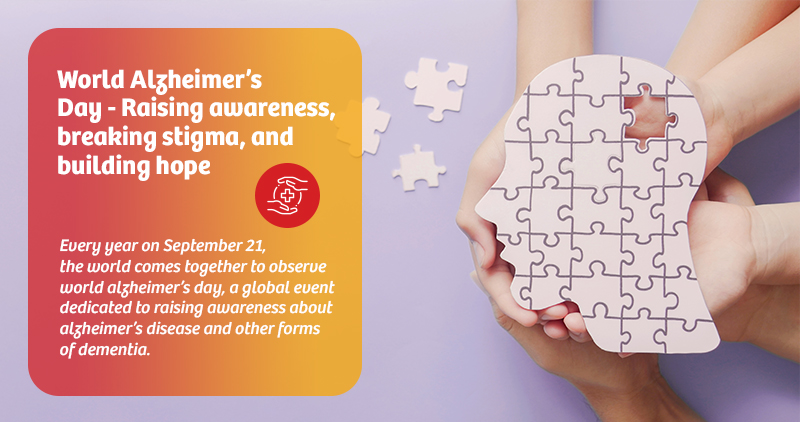Every year on September 21, the world comes together to observe world alzheimer’s day, a global event dedicated to raising awareness about alzheimer’s disease and other forms of dementia. Despite being one of the most common neurodegenerative conditions worldwide, alzheimer’s is still surrounded by stigma, misconceptions, and delayed diagnoses. This day is not just about creating awareness—it is about empowering patients, supporting caregivers, and encouraging early action.
In this blog, we will explore what alzheimer’s disease is, the significance of world alzheimer’s day, its impact on individuals and families, and the steps that can be taken for prevention, management, and support.
What is alzheimer’s disease?
Alzheimer’s disease is a progressive brain disorder that slowly damages memory, thinking ability, and daily functioning. It is the most common cause of dementia, accounting for 60–70% of all cases. The disease is characterised by the abnormal buildup of proteins in and around brain cells, particularly
- Amyloid plaques – clumps of protein that damage connections between nerve cells.
- Neurofibrillary tangles – twisted fibers that disrupt the transport system within brain cells.
Over time, this damage causes brain tissue to shrink and worsen cognitive decline.
Key symptoms include
- Memory loss that disrupts daily life
- Difficulty in problem-solving or planning
- Confusion about time, place, or identity
- Trouble communicating or finding the right words
- Withdrawal from social activities
- Changes in mood, behaviour, and personality
The significance of world alzheimer’s day
World Alzheimer’s Day was first launched in 1994 by Alzheimer’s Disease International (ADI). Since then, it has grown into a global campaign observed in over 100 countries. The aim is to
- Increase public awareness about Alzheimer’s and dementia.
- Reduce the stigma and myths surrounding the disease.
- Encourage early diagnosis and treatment.
- Advocate for better policies and healthcare support.
- Highlight the importance of caregiver support and community involvement.
The theme often changes every year but revolves around awareness, prevention, and care.
Global burden of alzheimer’s disease
Alzheimer’s is not just a personal or family issue—it is a public health challenge.
- Currently, more than 55 million people worldwide are living with dementia, with alzheimer’s being the leading cause.
- Every 3 seconds, someone in the world develops dementia.
- By 2050, the number of people with dementia is expected to triple, reaching 152 million.
This rising burden also places enormous financial and emotional strain on families and healthcare systems. The cost of dementia care globally runs into trillions of dollars annually, making it a pressing social issue.
Why early detection matters
Many families often confuse the early signs of Alzheimer’s with “normal ageing.” But timely recognition can make a significant difference.
Benefits of early diagnosis
- Access to medications that may slow progression in the early stages.
- Lifestyle modifications to support brain health.
- Better planning for the future—financial, medical, and personal.
- Reduced anxiety for both patient and caregiver through clarity and support.
Risk factors and prevention strategies
While age is the single biggest risk factor for alzheimer’s, it is not a normal part of ageing. Some factors increase the risk
- Non-modifiable risks: Age above 65, genetics (e.g., APOE-e4 gene), family history.
- Modifiable risks: High blood pressure, diabetes, obesity, smoking, alcohol use, poor diet, lack of physical activity, and social isolation.
- Additional factors contributing to memory loss include untreated hearing impairment, as studies indicate that deafness can accelerate cognitive decline. Furthermore, environmental factors such as air pollution have been associated with neurodegeneration, underscoring the importance of cleaner air and proactive, community-level preventive measures.
Prevention tips for brain health
- Keep your mind sharp by staying mentally active. Engage in activities such as reading, solving puzzles, and learning new skills.
- Exercise regularly: Aim for at least 30 minutes of moderate activity most days.
- Eat a brain-healthy diet: Rich in fruits, vegetables, whole grains, lean proteins, and healthy fats (Mediterranean diet).
- Control chronic conditions: Manage diabetes, hypertension, and cholesterol.
- Stay socially connected by spending time with friends, family, and your community to support brain health and emotional well-being.
- Get quality sleep: 7–8 hours daily.
- Quit smoking and limit alcohol.
- Address hearing issues: Regular hearing check-ups and timely use of hearing aids can help reduce memory decline.
- Support a cleaner environment: Reducing exposure to air pollution—by using masks, indoor air purifiers, and promoting cleaner air in the community—can help lower the risk of neurodegenerative changes.
Living with alzheimer’s: Support for patients and caregivers
Alzheimer’s impacts not just the patient but also their caregivers and families. The emotional, physical, and financial strain can be overwhelming.
For patients
- Creating a safe environment to prevent accidents.
- Using memory aids like notes, calendars, and reminders.
- Encouraging independence while providing supervision.
- Maintaining daily routines to reduce confusion.
For caregivers
- Educate yourself about Alzheimer’s disease to gain a deeper understanding of the patient’s needs and experiences.
- Practice patience and empathy during communication.
- Join caregiver support groups for shared experiences.
- Take breaks and prioritise self-care to avoid burnout.
- Seek professional counselling if overwhelmed.
The role of communities and healthcare systems
Alzheimer’s is not just a family issue—it requires community support and systemic change.
- Hospitals & clinics: Need specialised memory clinics and early diagnosis tools.
- Governments: Should increase funding for dementia research and care.
- Workplaces: Must adopt flexible policies to support employees caring for loved ones.
- Society: Should break stigma, show compassion, and include people with dementia in community activities.
Hope on the horizon: Advances in research
Medical research is continuously exploring ways to treat or delay Alzheimer’s. Some breakthroughs include
- Disease-modifying drugs targeting amyloid and tau proteins.
- Biomarker tests (blood and imaging) for earlier detection.
- Lifestyle trials show how diet, exercise, and cognitive training can delay the onset.
- Technology support like reminder apps, GPS trackers, and AI-powered caregiving tools.
Though a complete cure is not yet available, science is moving closer toward more effective therapies.
How you can contribute on world alzheimer’s day
- Educate yourself and others about alzheimer’s.
- Share stories on social media to spread awareness.
- Support caregivers in your community.
- Participate in awareness walks, seminars, or fundraisers.
- Advocate for better healthcare and research funding.
Even small actions—like checking in on a neighbour with dementia—can create a ripple effect of care and compassion.
In a nutshell
World alzheimer’s day is more than a date—it’s a call to action. With the global rise in dementia, we must recognise the signs early, adopt preventive habits, and provide compassionate support to those living with the disease.
By raising awareness, breaking the stigma, and promoting research, we can ensure that alzheimer’s patients and their families are not left to struggle alone. At KD Hospital we treat alzheimer patient under supervision of experienced neurologist with the state-of-the-art facility.
On this world alzheimer’s day, let’s pledge to build a world where memory loss does not mean dignity loss, and where every patient is met with empathy, care, and hope.

